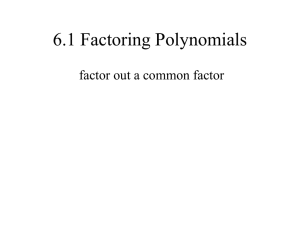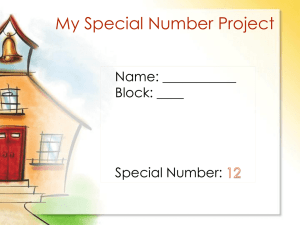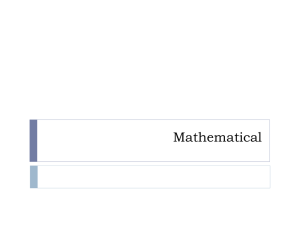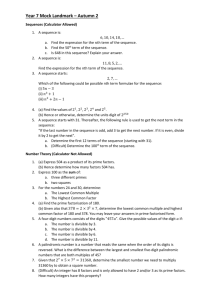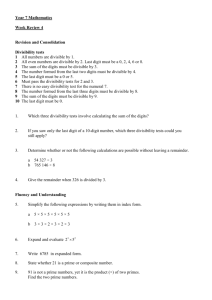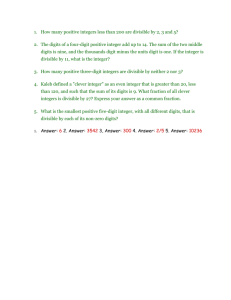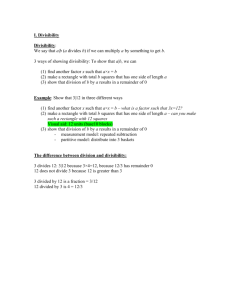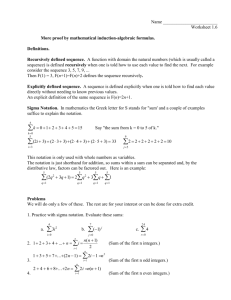Sieve of Eratosthenes – an easier way to find the prime numbers
advertisement
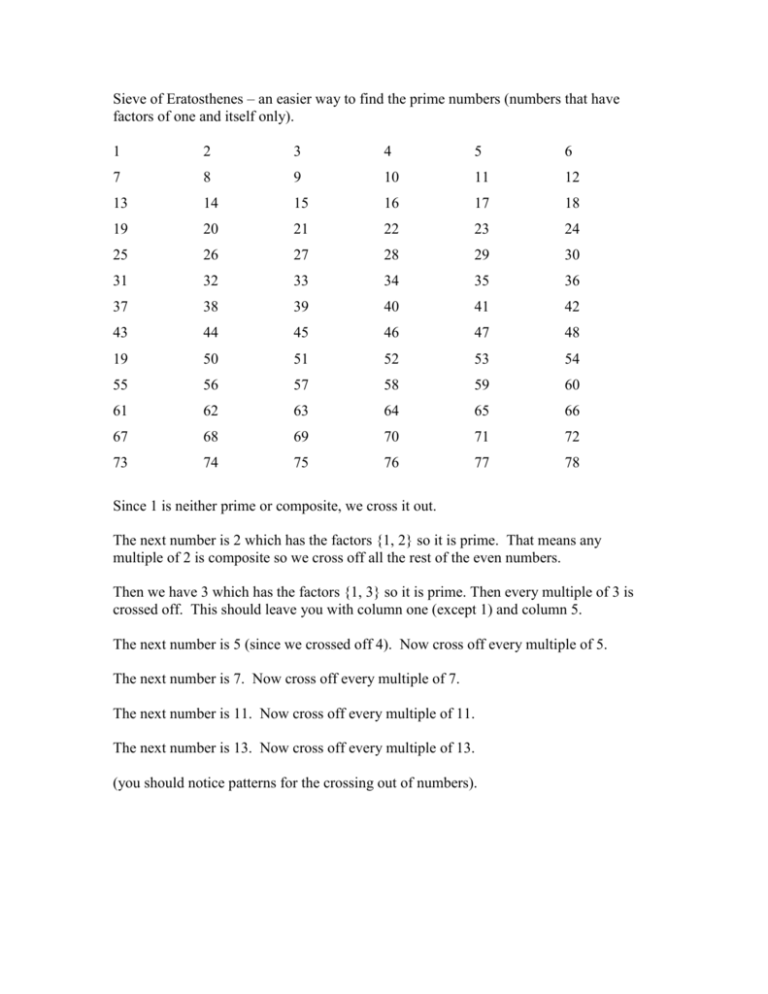
Sieve of Eratosthenes – an easier way to find the prime numbers (numbers that have
factors of one and itself only).
1
2
3
4
5
6
7
8
9
10
11
12
13
14
15
16
17
18
19
20
21
22
23
24
25
26
27
28
29
30
31
32
33
34
35
36
37
38
39
40
41
42
43
44
45
46
47
48
19
50
51
52
53
54
55
56
57
58
59
60
61
62
63
64
65
66
67
68
69
70
71
72
73
74
75
76
77
78
Since 1 is neither prime or composite, we cross it out.
The next number is 2 which has the factors {1, 2} so it is prime. That means any
multiple of 2 is composite so we cross off all the rest of the even numbers.
Then we have 3 which has the factors {1, 3} so it is prime. Then every multiple of 3 is
crossed off. This should leave you with column one (except 1) and column 5.
The next number is 5 (since we crossed off 4). Now cross off every multiple of 5.
The next number is 7. Now cross off every multiple of 7.
The next number is 11. Now cross off every multiple of 11.
The next number is 13. Now cross off every multiple of 13.
(you should notice patterns for the crossing out of numbers).
Answer to above problem – the numbers high-lighted are prime numbers.
1
2
3
4
5
6
7
8
9
10
11
12
13
14
15
16
17
18
19
20
21
22
23
24
25
26
27
28
29
30
31
32
33
34
35
36
37
38
39
40
41
42
43
44
45
46
47
48
49
50
51
52
53
54
55
56
57
58
59
60
61
62
63
64
65
66
67
68
69
70
71
72
73
74
75
76
77
78
Divisibility Math Tricks to Learn the Facts (Divisibility)
Tricks to be able to figure out if a number is divisible by … quickly.
Dividing by 2
1.
All even numbers are divisible by 2. E.g., all numbers ending in 0,2,4,6 or 8.
Dividing by 3
1.
2.
3.
Add up all the digits in the number.
Find out what the sum is. If the sum is divisible by 3, so is the number
For example: 12123 (1+2+1+2+3=9) 9 is divisible by 3, therefore 12123 is too!
Dividing by 4
1.
2.
3.
Are the last two digits in your number divisible by 4?
If so, the number is too!
For example: 358912 ends in 12 which is divisible by 4, thus so is 358912.
Dividing by 5
1.
Numbers ending in a 5 or a 0 are always divisible by 5.
Dividing by 6
1.
If the Number is divisible by 2 and 3 it is divisible by 6 also.
Dividing by 7 (2 Tests)
Take the last digit in a number.
Double and subtract the last digit in your number from the rest of the digits.
Repeat the process for larger numbers.
Example: 357 (Double the 7 to get 14. Subtract 14 from 35 to get 21 which is
divisible by 7 and we can now say that 357 is divisible by 7.
NEXT TEST
Take the number and multiply each digit beginning on the right hand side (ones)
by 1, 3, 2, 6, 4, 5. Repeat this sequence as necessary
Add the products.
If the sum is divisible by 7 - so is your number.
Example: Is 2016 divisible by 7?
6(1) + 1(3) + 0(2) + 2(6) = 21
21 is divisible by 7 and we can now say that 2016 is also divisible by 7.
Dividing by 8
1.
This one's not as easy, if the last 3 digits are divisible by 8, so is the entire
number.
2.
Example: 6008 - The last 3 digits are divisible by 8, therefore, so is 6008.
Dividing by 9
1.
2.
3.
Almost the same rule and dividing by 3. Add up all the digits in the number.
Find out what the sum is. If the sum is divisible by 9, so is the number.
For example: 43785 (4+3+7+8+5=27) 27 is divisible by 9, therefore 43785 is too!
Dividing by 10
1.
If the number ends in a 0, it is divisible by 10.
Dividing by 12
1.
If the number is divisible by 3 and by 4, then it is divisible by 12 also.
Homework: Are the following numbers Prime or Composite?
1.
2.
3.
46127
3011690031
476241637
Prime Number: is a number that has factors of 1 and itself.
Example:
7 = {1, 7}
11 = {1, 11}
Composite Numbers: is a number that has factors of 1, itself and another number.
Example:
4 = {1, 2, 4}
9 = {1, 3, 0}
12 = {1, 2, 3, 4, 6, 12}
Unique Factorization Theorem
There is only one way to express the number as a product of prime numbers.
Use the factorization tree you did in 6th grade:
Example:
32 = 2 x 2 x 2 x 2 x
2 = 25
You try 28:
Homework:
1. Is 2593 Prime?
If it is not, put it into the unique prime factorization form.
2. Is 3792 Prime?
If it is not, put it into the unique prime factorization form.
3. Is 72651 Prime?
If it is not, put it into the unique prime factorization form
